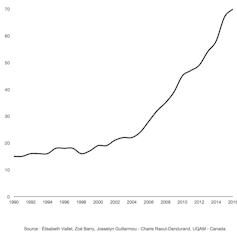 |
| The border wall between Tijuana, Mexico and San Diego, Calif. Tomascastelazo/Flickr, CC BY-SA |
Europe’s Baltic States, worried about invasive neighbours, are raising a fence along their eastern frontier. Meanwhile, in Asia, Chinese President Xi Jinping is calling for the building of an iron wall around the Xinjiang region.
In Latin America, Ecuador appears to have begun erecting concrete panels along the Peruvian state line. In Africa, a barrier between Somalia and Kenya, made of barbed wire, concrete and posts, is nearing completion.
This is a far cry from the illusion generated by the fall of the Berlin Wall — and by the utopian dream of a world without borders that emerged in the 1990s.
The Wall: a new status quo in international relations
At the end of the Cold War there were just 15 walls delimiting national borders; today, with 70 of them in existence around the world, the wall has become the new standard for international relations.
 |
| More walls in a world without borders. |
With the proliferation of border walls and their normalization in the rhetoric of U.S. President Donald Trump, democracies have adopted the tactic as though it were a classic policy tool in foreign relations and defence.
And yet these rampant fortifications come at a hefty price, as much for the governments and international relations as for the local economies and populations affected. For those most vulnerable, for the middle class, for those pushed out by the walls (Saskia Sassen’s “expelled” peoples), the cost is exorbitant.
As symptoms of a rift in the world order, as manifestations of the failings of international cooperation, these barriers also come at a cost to those they shut out — the world’s “untouchables”.
